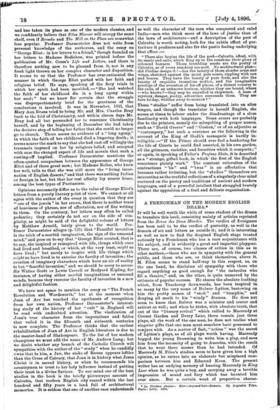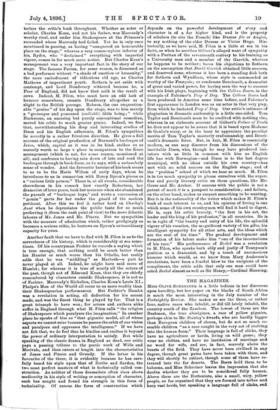A FRENCHMAN ON THE MODERN ENGLISH DRAMA..*
IT will be well worth the while of some student of the drama to translate this book, consisting mainly of articles reprinted from the Revue des Deux Mondes. The verdict of foreigners has been said to be the verdict of posterity, as well in the domain of art and letters as outside it; and it is interesting as well as new to find the despised English stage treated seriously by a Frenchman who has a rare acquaintance with his subject, and is evidently a great and impartial playgoer. There are, of course, two classes of critics in this as in other matters,—those who are in sympathy with the general public, and those who are, or think themselves, above it. M. Filon seems to stand half-way in this respect, as, on the one hand, he disclaims all sympathy with those who regard anything as good enough for "the imbeciles who fill a theatre," and, on the other, is quite unmoved by the estimate of popular success. He shares the absolute loathing which, from Thackeray downwards, has been inspired in so many by the very name of Bulwer Lytton, bestowing on him the pretty names of " snob " and "bumpkin," and denying all merit to his " windy " dramas. He does not seem to know that Bulwer was a minister and orator and satirist as well ; and when he states, with absolute truth, that out of the "literary revival" which rallied to Macready at Covent Garden and Drury Lane, there remain just three plays, all the work of the one man, he does not realise what singular gifts that one man must somehow have possessed to conjure with. As a matter of fact, " action " was the secret of Lytton's plays, as of all plays worth having. Macready begged the young Browning to write him a play, and save him from the necessity of going to America, with the result that he went there sooner than he had intended- Of Macready M. Filon's studies seem to have given him a high opinion, as he enters into an elaborate but misplaced com- parison between him and Edmund Kean. The present writer has an undying memory of hearing Macready in Sing Lear when he was quite a boy, and carrying away a terrible impression of sound and fury which has haunted him ever since. But a certain want of proportion charac-
• Le Thediro Anglais: Bier—siujoard'hui—Dnnain. By Augustin Filon. Paris: Levy. 1896.
tenses the critic's book throughout. Whether as actor or scholar, Charles Kean, and not his father, was Macready's worthy rival, and under him Shakespeare at the Princess's succeeded where Macready had failed. Yet he is only once mentioned in passing, as having "conquered an honourable place on the stage," whereas a very commonplace inferior of his, Ryder, who "declaimed" everything with impartial vigour, comes in for much more notice. But Charles Kean's management was a very important fact in the story of our stage. The famous Farren, for some reason, is dismissed as a bad performer without "a shade of emotion or humanity," the mere embodiment of ridiculous old age, as Charles Mathews of impertinent youth. Sothern is set aside with contempt, and Lord Dandreary withered because he, a Peer of England, did not know that milk is the result of cows. Indeed, M. Filon, who must have an odd lack of humour somewhere, resents D undreary altogether as a slight to the British peerage. Robson, the one unquestion- able "genius" of his day upon the stage, was to hits merely a "grotesque and possessed (endiable) little being ; " while Buckstone, an amusing but purely conventional comedian, moved his critic to much greater praise. Indeed, we fear that, notwithstanding his deep and interesting studies of Ibsen and his English adherents, M. Filon's sympathies lie secretly in a rather frivolous direction. He gives a fall account of the original production of Barnand's burlesque of Izion, which, capital as it was in its kind, strikes us as scarcely worth so large a place in comparison to the Kean management (which is not, for some reason, mentioned at all), and confesses to having sate down of late and read the burlesque through in book-form, as he says, with a melancholy sense of wonder. And the favourite heroine of his book seems to us to be the Marie Wilton of early days, whom he introduces to us in connection with Henry Byron's pieces as a "curious little person." There is, at all events, considerable shrewdness in his remark how exactly Robertson, her dramatist of later years, took her measure when she abandoned the pursuit of "burlesque boys," and wrote a succession of " gamin " parts for her under the guard of the modern petticoat. After this we feel it rather hard on Charley's Aunt when he depreciates the public taste for so much preferring it (from the cash point of view) to the more didactic labours of Mr. Jones and Mr. Pinero. But we sympathise with the measure of admiration which, rather grudgingly as becomes a serious critic, he bestows on Byron's extraordinary capacity for puns.
Another fault that we have to find with M. Filon is as to the correctness of his history, which is considerably at sea some- times. Of his countryman Fechter he records a saying which is true enough, that nothing could be much better than his Hamlet or much worse than his Othello, but rashly adds that he was " middling " as Macbeth—a part he never played at all. Indeed, he might have said more of Hamlet ; for whereas it is true of nearly all the actors of the past, though not of Edmund Kean, that they are chiefly remembered by characters outside Shakespeare, it is not so of Fechter. Macready's Richelieu, Charles Kean's Louis XI., Phelps's Man of the World all recur to us more readily than their Shakespearian performances. But Fechter's Hamlet was a revelation in acting, all deduction for his accent made, and was the finest thing he played by far. That is a great triumph to have won; for actors and authors alike suffer in England through what M. Filon calls "the religion of Shakespeare which paralyses the imagination." In another place he speaks of him as "that gigantic model, all of whose aspects we cannot seize because he passes the orbit of our vision and paralyses and oppresses the intelligence." If we have not felt that, we do feel tbat he kindles and excites it beyond the power of ordinary interpretation to satisfy. But while speaking of the classic drama in England as dead, our critic pays a passing tribute to the poetic work of Wills and liferivale, and then enters at length into the characteristics of Jones and Pinero and Grundy. If the latter is his favourite of the three, it is evidently because he has care- fully based his style upon that of Scribe and Sardou, the two most perfect masters of what is technically called con- struction. As neither of these dramatists often rises above mediocrity in his style of writing or conception of character, each has sought and found his strength in this form of technicality. Of course the form of construction which
depends on the powerful development of story and character is of a far higher kind, and is the property of scholars (to cite the French) like Dumas fi/s or Angier, to say nothing of the elder Dumas or Victor Hugo. His- torically, as we have said, M. Filon is a little at sea in his facts, as when he ascribes Gilbert's alleged want of sympathy with a Puritan of the seventeenth century to his training as a University man and a member of the Garrick, whereas he happens to be neither; bases his objections to Sothern on the assumption that David Garrick obtained little success, and deserved none, whereas it has been a standing dish both for Sothern and Wyndham, whose style is commended as worthy of the Francais; or condemns Boucicault, a dramatist of great and varied power, for having seen the way to success with his Irish plays, beginning with the Colleen Baton, in the example of Falconer's Peep o' Day. The Colleen Baum had been produced in America some time before, and Falconer's first appearance in London was as an actor in that very play, from which he imitated Peep o' Day. Our critic's estimate of plagiarism in dramatic authorship is a little one-sided. Tom Taylor and Boucicault seem to be credited with nothing else, whereas in an elaborate account of Gilbert's Palace of Truth he does not appear to be aware that it is based upon Madame de Geniis's story, or in the least to appreciate the peculiar merits of Tom Taylor's masterly craftsmanship and Bouci- cault's dramatic force. Bat, in fact, M. Filon is essentially modern, as one may discover from his discussions of the inevitable Ibsen, who, though he may have produced imi- tators with as little in common with him as English life has with Norwegian—and Ibsen is to the last degree municipal, with no ideas outside his own country—has met with no solid success on the English stage ; and of the " problem " school of which we hear so much. M. Filon is in too much sympathy to please ourselves with the super- fine and purely literary critic on these questions, like Mr. Gosse and Mr. Archer. If success with the public is not a. patent of merit it is a passport to consideration; and failure, on the other hand, makes us suspect something to be wanting. But it is the nationality of the writer which makes M. Filon's book of such interest to us, and his opinion of Irving is one which some of his own countrymen will find it hard to digest. He is, says his critic bravely, "the first in his art, the leader and the king of his profession," in all countries. He is so in right of "the beauty and unity of his life, the splendid vigour of his vocation, the magnificent variety of his gifts, his intelligent sympathy for all other arts, and the ideas which are the soul of his time." The gradual development and formation of his talent make him "one of the incarnations of his race." His performance of Becket was a revelation to H. Filon, who speaks both ably and justly of Tennyson's position as a dramatist, and by a touch of unconscious humour which would, as we know from Mary Anderson's revelations, have been a fearful blow to the recipient of the compliment, the critic adds that only one man could have acted Becket almost as well as Sir Henry,—Cardinal Manning.











































 Previous page
Previous page